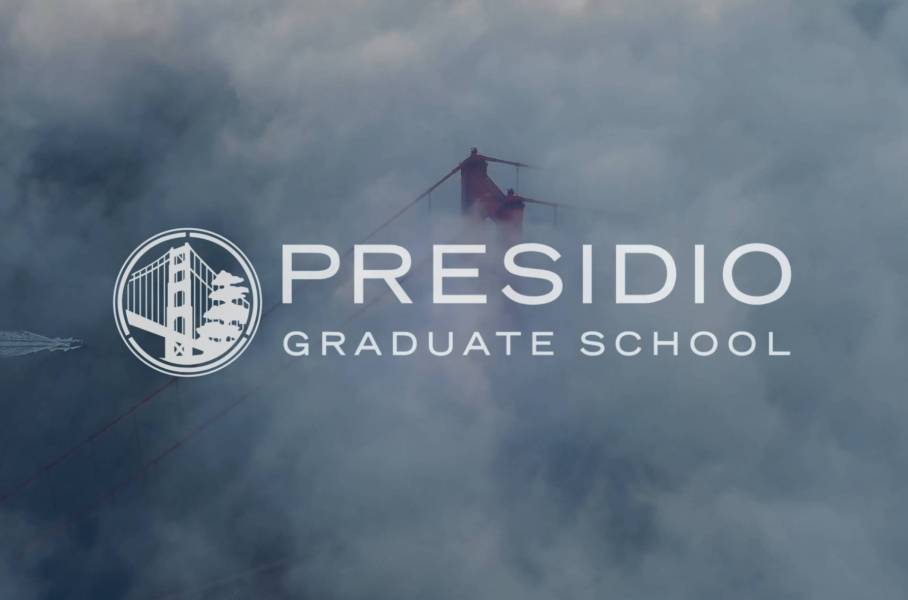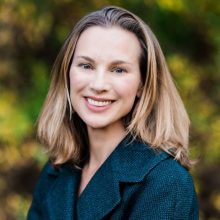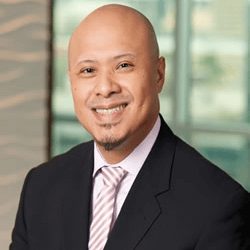Elizabeth Maw currently servers as the President of Presidio Graduate School. Her mission is to help people build the skills, knowledge, and connections they need to drive positive change. It is her sincere honor to lead the world’s best graduate program for mission-driven students to hone their ability to make a difference. She is the new guest in this Higher ED Thought Leadership Series by Dr. Emad Rahim.

President Maw’s early career was spent honing her change-making skills as a consultant and fundraiser with mission-driven organizations. During this time, she had the pleasure of working with top social sector organizations, including the International Rescue Committee, Trust for Public Land, and VolunteerMarch. In 2004, she joined Net Impact as their CEO and led them on a journey for over 14 years where we grew from 80 chapters to more than 300 globally, while creating dynamic new programs in racial equity, impact investing, food systems, climate, and more.
She earned a BA degree in English from Yale University and an MBA degree from Columbia Business School with a semester spent on an exchange program at UC Berkeley’s Haas School of Business.
Emad Rahim: Please tell us how you got started in your career as President of Presidio Graduate School (PGS).
Elizabeth Maw: I believe everyone benefits from a personal mission, and for well over a decade, mine has been to equip emerging leaders with the skills they need to change the world. Previously, I pursued this mission at a wonderful nonprofit called Net Impact, working across university campuses. After many years there, I wanted to go deeper into how to best educate aspiring changemakers. I had a lot of respect for Presidio Graduate School and happened to see the open position – a spark was lit!
E.R: What is your leadership style, and how has it evolved during your presidency?
E.M: My favorite part of leadership is working collaboratively with my team to solve problems and make things happen. While it is hard to say if my style has evolved during my time at PGS, I can say that I have relied more on certain leadership competencies than others. The first is resiliency, which has served me well in navigating the challenges and uncertainty of leading a small school through COVID-19. The second would be communication skills, which have become much more important during a pandemic where stress is high and everyone is virtual. Working with a remote staff, faculty, and student body, I’ve learned that I needed to alter my communication style to meet people where they are. The last year has taught me to enhance my focus on how often and in what ways our leaders communicate with our community.
E.R: What is the mission of the President of Presidio Graduate School and what
makes your university unique?
E.M: The mission of Presidio Graduate School is to educate changemakers to build a flourishing future for all. PGS has a unique and vital mandate to educate high potential changemakers to drive positive and transformative impact. We center our curriculum on sustainability, systems thinking, and social justice. These critical filters overlay our entire academic approach, even in mainstream courses like accounting and operations. Right now, PGS is focused on expanding our work to support future leaders in a greater number of fields: business, public sector, and K-12 education.
E.R: Given PGS residencies, campus graduation, and other in-person events have been combined with your online degree programs during the pandemic, how is the university addressing student and staff safety and academic accessibility?
E.M: We are all certainly missing our in-person classes and events but keeping everyone safe is our top priority. We have addressed student and staff safety and academic accessibility issues by moving all instruction, student and community activities, and staff operations fully online. Other academic institutions have been severely challenged by the pandemic, due to the size and scope of their campus operations. Fortunately, at PGS, we were able to make a swift, smooth transition to online learning modalities with minimal disruption thanks to our experience with low-residency programs.
While everyone’s physical health and safety are obviously paramount, we also know this has been a difficult time for people on an emotional level. We’re thinking about how we can recognize that and be attentive to the mental health needs of our community. Connection and learning go hand-in-hand, and we’ve done our best to preserve some level of community engagement, albeit virtually.
Our faculty have done a stellar job of creating space for students to learn while acknowledging how difficult that can be during these unusual circumstances. They’ve innovated to create exciting classrooms, full of inquisitiveness and learning, balanced with the care and compassion that everyone needs right now.
More Higher Ed thought leadership Series Interviews
Emad Rahim Interviews Dr. Mary Hawkins, President of Bellevue University
Emad Rahim Interviews Merodie A. Hancock, PhD President, Thomas Edison State University
E.R: And with more universities going online, what type of things are you doing to set your online graduate programs apart?
E.M: PGS offers a unique online learning experience with our deep sense of community and our shared commitment to sustainability and social justice. Presidians are highly engaged with each other, as well as with their communities and the world around them. This care and compassion are what unite our community, in person or online. The students and faculty at PGS are inspired by the potential each individual has to help shape the world, and every day they are committed to developing those skills and abilities.
More tactically, we have also been able to set our academics apart through our small online class sizes and the use of instructional tools, such as Zoom and Canvas. A variety of integrated third-party tools help us increase student engagement. In addition, PGS has established structures within the technology to support the executive functioning skills of our students, such as enhanced ability to monitor progress on assignments.
E.R: Where do you see the university going in the next five years given all of the challenges and changes that higher education is facing around the world?

E.M: Higher ed is at an inflection point, and Presidio, in spite of our small size, can set an example of what the future of learning can look like. As a small school, we must be innovative, nimble, and adaptive in order to thrive – this is in our DNA. The changes facing higher ed are ones we are uniquely positioned to manage and lead. For example, we do not have a campus, so moving more learning online is a natural step to explore. Secondly, we have always kept our costs low to help keep our tuition accessible , and we will continue to compete with a quality education offered at a very competitive price point. Finally, we will further develop affordable learning opportunities, such as our recently launched course for under $300. Sometimes, an untraditional player has an advantage when their industry is shifting, and I see that is true for PGS right now in the broader higher ed landscape.
E.R: Given the Black Lives Matter movement, protests, and rallies against racism and police brutality happening across our nation, do institutions like Presidio Graduate School have a responsibility in addressing these social justice issues?
E.M: Yes, absolutely. As a school and an institution, PGS has always worked to equip our students with the tools they need to build more sustainable, equitable futures for their organizations and their communities. As an academic community, we must engage with racial injustice inside and outside the classroom. Our program aspires to train effective leaders, and that must mean anti-racist, equitable leadership. We are currently revamping our leadership curriculum to ensure that anti-racism is at the core of our leadership development programming. While this effort was started before the heightened BLM awareness of the past year, recent current events do give us more urgency to get it right.
E.R: Faculty play a critical role in the development of your students’ learning and in helping build their professional competencies. What type of things are your faculty involved in or doing that make their classroom unique to their learning experience given the sustainability mission of your university?
E.M: Our faculty are an amazing group of practitioners and academics. They make their classroom experience unique by bringing in real-world problems, cases, and projects from mission-aligned organizations – sometimes ones led by our own alumni! For example, during a course of study, a student might develop a marketing plan for a B-Corp (social purpose company), analyze ways a Fortune 500 supply chain could be more sustainable, and develop a business plan for a new nonprofit organization. Secondly, thanks to our small size, our faculty create unique learning experiences by focusing more on co-learning in the classroom, meaning they lead deep and rich conversations so that students can take an active role in the classroom outcomes. While this is helpful for all adult learning, it is particularly valuable to have student participation when learning how to address complex system issues like climate change, racism, and global poverty.
E.R: What type of qualifications and experiences do your faculty bring to the class? How do you make sure they stay updated in their area of expertise and field of study?
E.M: PGS faculty bring in a mix of theory and practice to the classroom. They are practitioners with deep awareness of market needs, economic inequity, social injustice, and environmental threats facing our society. They are also passionate about teaching and the pursuit of thought leadership in partnership with their students. We encourage our faculty to engage in partnership with businesses, and public and nonprofit organizations, to ensure that classroom innovation is well grounded in the needs of the real world while advancing the leading edge for change.
E.R: We learned a great deal about you and your school. If I was a potential student or employer that was stuck between choosing two different online/hybrid MPA and MBA programs, what other things would you want me to know about your degree and university to help with my selection?
E.M: We would love to welcome more students and employers into the PGS community. The MBA and MPA programs at Presidio Graduate School are truly unique in several ways that we are proud of.
We are a school for those who are dedicated to solving humanity’s most difficult challenges. As a New York Times article wrote, “If you join us, you will be surrounded by others who share your aspiration to change our communities, our companies, and our system. Being surrounded by like-hearted people is invigorating, inspiring, and—practically speaking—helpful for your professional network.” In other graduate programs, just a fraction of students or alumni share these career aspirations, which can limit your classroom conversations, job search resources, and professional growth. At PGS, everyone is fundamentally committed to using their skills and careers to advance sustainability and social justice—all of our students, faculty, staff, and alumni. That creates a rich and vibrant community, and therefore the entire community is positioned to engage with and support you: in networking, mentorship, and more.
In addition, the PGS community is highly supportive and inclusive. While some programs foster competition among peers as a motivational strategy, the PGS programs are designed to encourage collaboration. Faculty, staff, and student leaders are in constant communication about ways that we can ensure all students and alumni can achieve their goals and get access to important resources and opportunities—without having to compete against each other. If you find it motivating and engaging to be supported in a highly collaborative and inclusive community—PGS is the place for you.
Our hybrid MBA program has several hallmarks that it has become well known for, namely the in-person residency and the experiential learning projects. We recently updated our MPA program, which has a few notable features of its own, including our 100% virtual, part-time format and our Mentor in Residence, who provides valuable individual coaching to students.
Finally, PGS is small—in a good way! Due to our size, we can provide truly individualized attention and support to our students. Our staff and faculty will know you and know your story. Our students build connections that last a lifetime.

Dr. Emad Rahim is an award-winning entrepreneur, educator, author, community leader and TEDx Speaker. He currently serve as the Endowed Entrepreneur-in-Residence at Oklahoma State University and teaches at the Jack Welch Management Institute in the Executive MBA program. He was recognized by the United Nations Foundation as a 2013 Empact100 Honoree for his social entrepreneurship work, received a Congressional Award for his community service and was the recipient of the Forty Under 40 Business Leadership Award sponsored by Syracuse University. His personal story was turned into a short documentary, “Against the Odds,” and featured in the Huffington Post and Forbes. He co-authored “Leading Through Diversity: Transforming Managers Into Effective Leaders” and “The 4-Tions: Your Guide to Developing Successful Job Search Strategies” and is a frequent contributor to the Refractive Thinker book series, CEO Magazine, TweakYourBiz and YFS Entrepreneurship Magazine. Fellow him on Twitter @DrEmadRahim





























